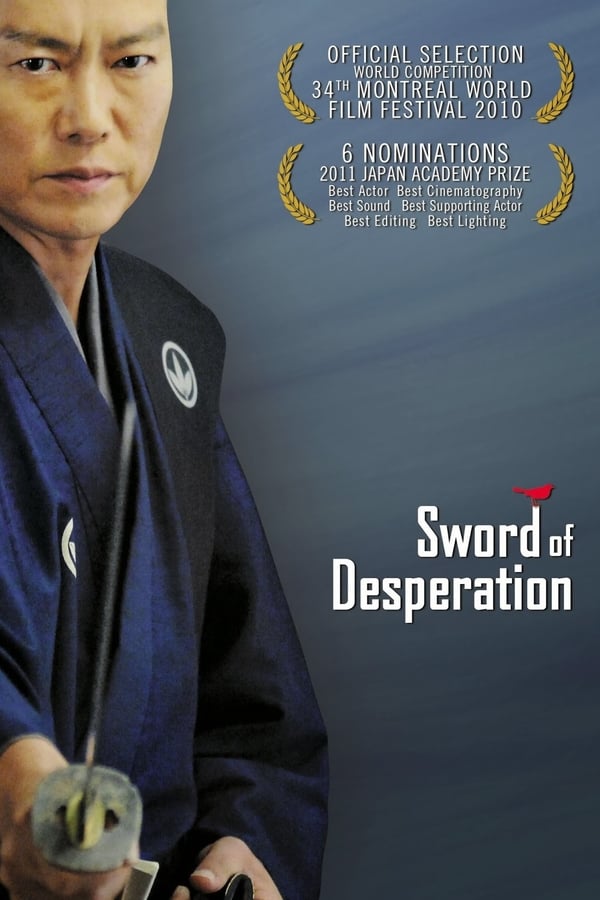Toggle light
Comments
63 Views
Report
FavoriteIf current server doesn't work please try other servers below.
Server
Vidsrc
Server
1080P Only No ads
Server
GD
Server
StreamBucket

Sword of Desperation 2010 Full Movie fmovies
Sword of Desperation Full Movie fmovies: A Tale of Betrayal and Redemption
In the heart of the Edo period, the powerful daimyō Ukyo-dayu and his court gather for a captivating Noh play in the courtyard of his grand palace. The play, centered around a cunning fox spirit, mirrors the themes of deception and trickery that will soon unfold in this gripping narrative.
Similar Content
The Tragic Death of Lady Renko
As the performance concludes, the court bows in respect while Lord Ukyo and his family, including his beloved concubine Lady Renko, prepare to leave. In a shocking turn of events, a samurai named Sanzaemon Kanemi unsheathes his tantō and fatally stabs Lady Renko. He surrenders without resistance and is taken into custody, fully expecting to face execution for his heinous act. However, Lord Ukyo surprises everyone by sentencing Kanemi to a year of house arrest instead.
Isolation and Reflection: Kanemi’s Year of House Arrest
Kanemi’s estate is barricaded, and armed guards are stationed to watch over him. He is confined to a makeshift cell within a woodshed, with only his young niece, Rio, remaining to care for him after the death of his wife. As the months drag on, Kanemi reflects on his crime and the events leading up to it. Flashbacks reveal how Lady Renko had angered powerful court officials, including Lord Ukyo’s chief advisor, Minbu Tsuda, by insisting on extravagant expenses and raising taxes during a devastating famine.
Hayatonosho Obiya, a senior military commander, is horrified to learn that Lady Renko orchestrated the execution of several peasants who dared to petition Lord Ukyo against the oppressive taxes. He argues for her removal, but his pleas fall on deaf ears. Eventually, Tsuda realizes that drastic measures must be taken and persuades Kanemi to assassinate Lady Renko. In a twist of fate, Tsuda manages to convince Lord Ukyo to spare Kanemi’s life, earning a promotion for his cunning manipulation of the situation.
Freedom and New Responsibilities
After a year of confinement, Kanemi is released and appointed as Lord Ukyo’s bodyguard, a decision that displeases the lord. Despite Kanemi’s request for dismissal, he is compelled to accept his new role. Tsuda confides in Kanemi that this appointment is part of a larger strategy to counter Obiya, who has grown disillusioned with Lord Ukyo’s leadership and seeks to usurp power. Kanemi’s unique fighting technique, the “Sword of Desperation,” becomes a focal point in this plan, though its effectiveness hinges on the user being “half-dead,” a concept Tsuda struggles to grasp.
Forbidden Love and Betrayal
In a moment of vulnerability, Kanemi attempts to introduce Rio to a potential suitor, believing she will find happiness away from him. However, Rio confesses her deep feelings for her uncle, pleading to remain by his side. One fateful night, unable to resist temptation, Kanemi and Rio share an intimate encounter. The next day, he instructs her to wait for him in a remote village, promising to reunite once his obligations to the court are fulfilled.
The Climactic Duel: Kanemi vs. Obiya
As tensions rise, Obiya storms into Lord Ukyo’s palace, threatening violence if the lord does not step down. Kanemi confronts him, leading to a fierce duel. In a display of skill, Kanemi manages to drive Obiya’s sword into the wall before delivering a fatal blow. However, the victory is short-lived as Tsuda and a group of samurai emerge, surrounding Kanemi and branding him a murderer.
The Final Confrontation and the Sword of Desperation
In a flashback, it is revealed that Tsuda had promised Lord Ukyo that Kanemi would be executed once he dealt with Obiya. Faced with overwhelming odds, Kanemi is gravely wounded but manages to kill several attackers before crawling towards Tsuda. Just as Tsuda approaches, believing Kanemi to be defeated, Kanemi springs back to life and executes the “Sword of Desperation,” killing Tsuda in a final act of defiance.
The Tragic Conclusion: A Legacy of Love and Loss
As chaos ensues, Lord Ukyo hides in fear while his samurai stab Kanemi repeatedly. Despite the onslaught, Kanemi kneels peacefully, accepting his fate. The film concludes with a poignant scene of Rio, now cradling Kanemi’s infant son, waiting for his return, symbolizing the enduring











